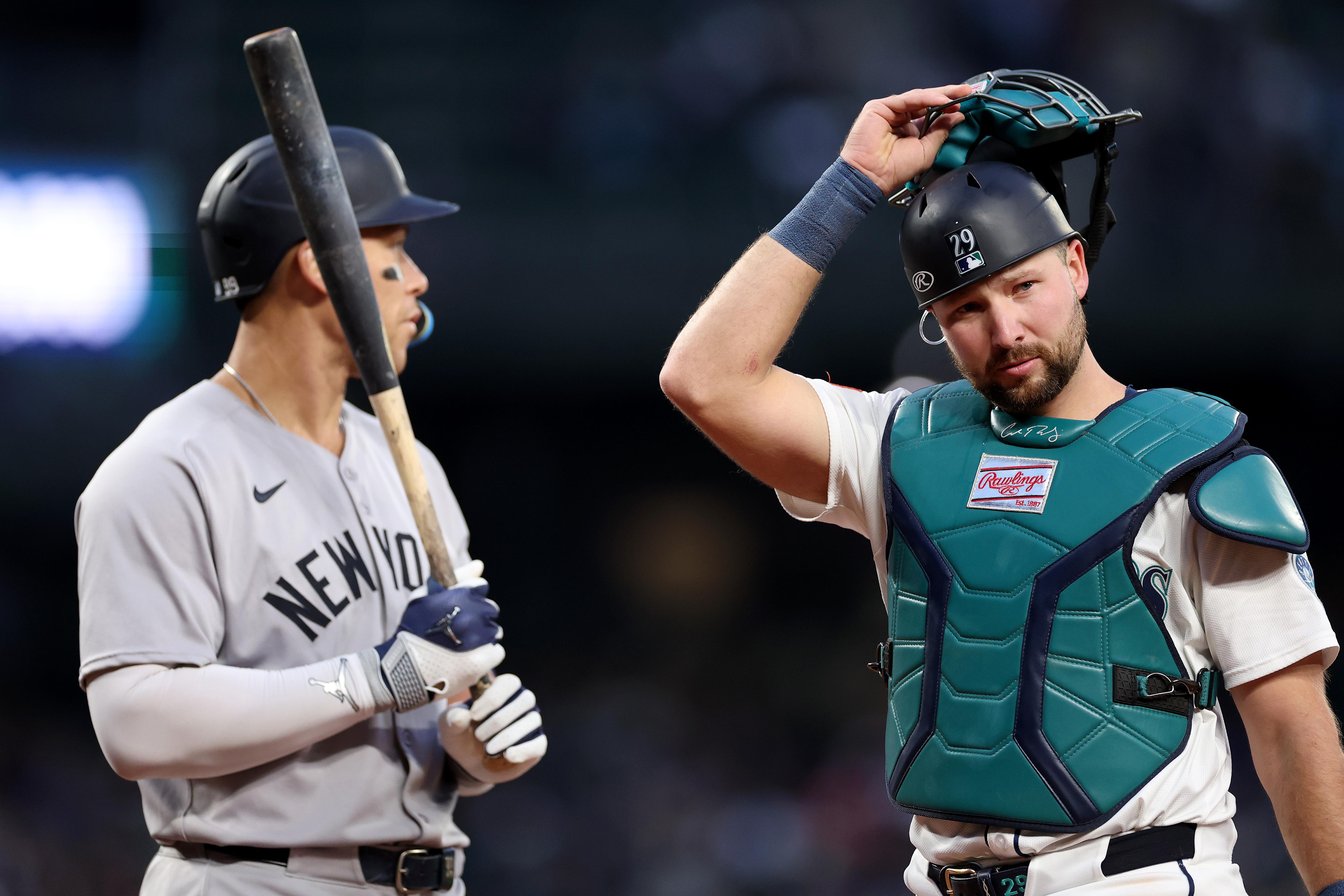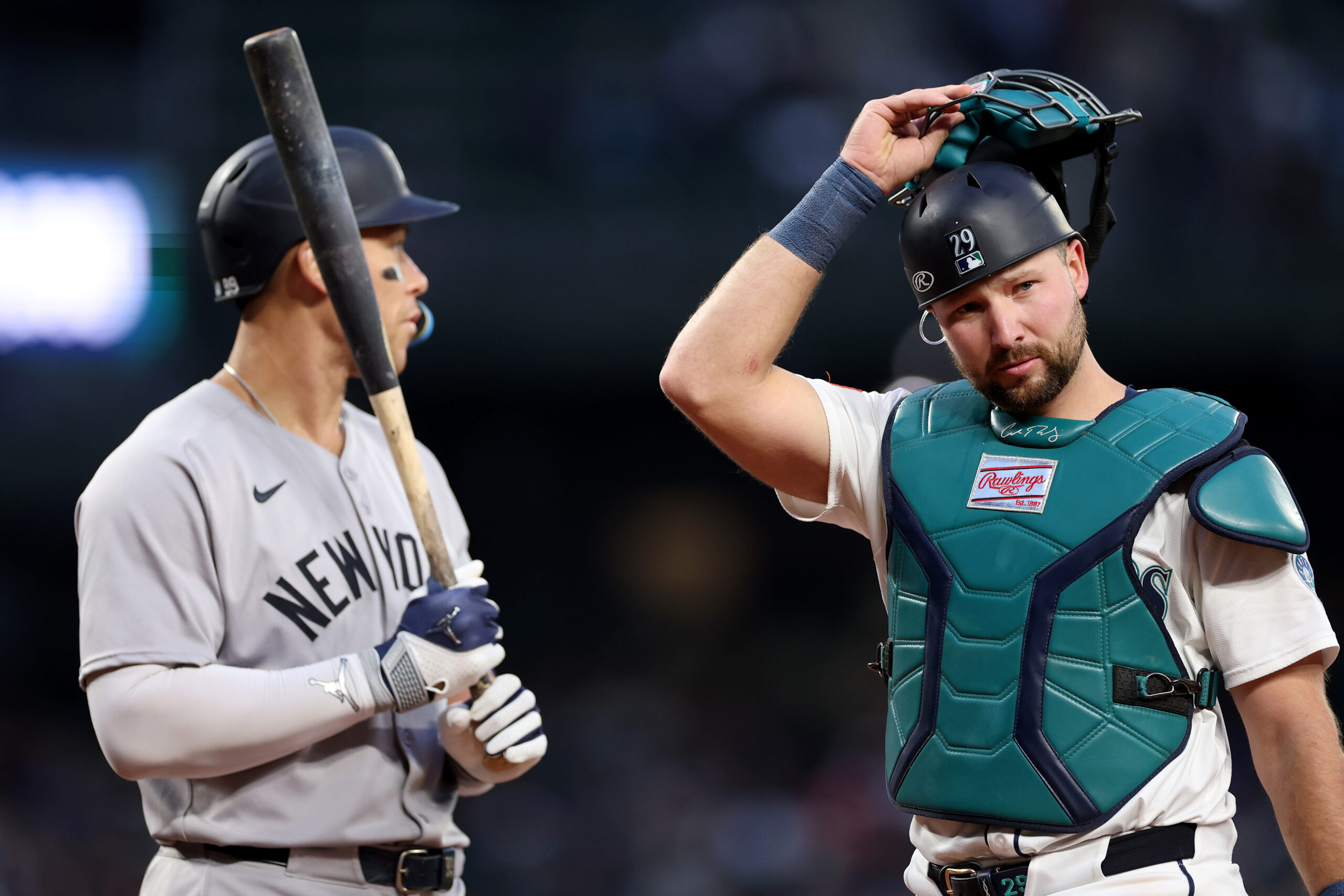MLB’s MVP Race: A Battle of Titans or a Divided Fanbase? Just Like Political Polarization, the Fight Between Judge and Raleigh Sparks Controversy
As Major League Baseball (MLB) prepares to crown its Most Valuable Player (MVP) for the season, the announcement of finalists has ignited passionate debates that echo the stark political divisions seen in society today. The nominees for the American League MVP award—Aaron Judge of the New York Yankees, Cal Raleigh of the Seattle Mariners, and José Ramírez of the Cleveland Guardians—illustrate not only exceptional athletic achievements but also the cultural narratives that fans rally behind. The controversy surrounding who deserves the title of MVP is reminiscent of the fervent societal discussions that arise in political elections, where loyalty often outweighs rationale.
The MVP race this season is centered on two extraordinary players: Judge and Raleigh. Each athlete has crafted a compelling case for why they deserve the prestigious award, yet their supporters are nearly as divided as political factions during a heated election cycle. Judge, a seasoned slugger, aims for his third MVP trophy, while Raleigh, a breakout star, has swiftly captured the hearts of Mariners fans with record-setting performances. The parameters defining their greatness are simultaneously objective, such as home runs and batting averages, and subjective, involving the emotional narratives that fans invest in their journeys.
Cal Raleigh’s emergence as a power hitter in 2025 has transformed him into a symbol of hope for the Mariners’ fan base. He finished the season with an astonishing 60 home runs, ranking as the ninth-highest single-season total in MLB history. His ability to not only crush home runs but also drive in runs—leading the American League with 125 RBIs—illustrates his worth as a cornerstone player for Seattle. Furthermore, Raleigh’s .247/.359/.589 slash line demonstrates a level of effectiveness that, while not flawless, is indicative of his overall impact on the game. The Mariners’ success, culminating in an AL West title and a trip to the AL Championship Series (ALCS), is often tied to his performance, sparking a fervor among fans who see him as the embodiment of their team’s resurgence.
On the opposing side, Aaron Judge’s legacy looms large. A player of historic caliber, Judge’s pursuit of his third MVP award comes on the heels of another extraordinary season, where he hit 53 home runs—no small feat in a sport where power-hitting is revered. His .331 batting average and impressive .457 on-base percentage reflect not just raw power but a sophisticated batting approach that has solidified his status among the league’s elite. The Yankees’ fans view Judge as the face of baseball, a player who not only delivers on the field but also carries the weight of the franchise’s storied history. The narrative surrounding Judge transcends numbers; it’s about resilience, leadership, and loyalty to the iconic Yankees brand.
Yet, as the MVP race heats up, it raises the question of whether this contest is merely about statistics or if it represents a deeper cultural divide within the baseball community. Some fans rally passionately behind Judge, viewing him as the ultimate representation of Yankee pride and history. Others, increasingly disillusioned by the traditional narratives of the sport, champion Raleigh as the new wave of talent that signifies a shift in the league towards young, dynamic players. This dichotomy mirrors broader societal trends where established entities are challenged by rising voices, leading to fervent debates about legacy, identity, and merit.
While José Ramírez remains a formidable candidate by virtue of his consistent performances and contributions to the Guardians, the spotlight predominantly shines on the clash between Judge and Raleigh, intensifying the stakes of the MVP award far beyond the realm of mere baseball statistics. The perception of who deserves the MVP title becomes a reflection of broader discussions regarding fandom allegiance, regional pride, and the narratives we create around athletes.
In the National League, the MVP discussions are equally electrifying, with Shohei Ohtani, Kyle Schwarber, and Juan Soto vying for recognition. Ohtani, a two-way player with unparalleled talent, is considered a favorite for his fourth MVP trophy. His ability to impact the game both as a pitcher and batter introduces a complexity that challenges traditional notions of value. As fans debate whether his contributions warrant the MVP consideration, it opens the door for discussions about what it means to be valuable in a team sport.
The dichotomy between Judge and Raleigh, and Ohtani’s unique position, brings to light the evolving narrative of modern baseball. The sport is witnessing a generational shift, where diverse styles of play and different success stories converge. This evolution parallels societal changes where established norms are questioned, leading to passionate discussions and sometimes divisive opinions.
As the finalists for the major individual awards are announced, the MLB finds itself at a crossroads. Fans are no longer passive observers; they are actively engaged in the narratives surrounding their favorite players, shaping the discourse through their passionate support. The MVP race offers a microcosm of contemporary societal debates, where loyalty, identity, and merit intertwine in a complex tapestry of human experience.
As the awards ceremony approaches, the anticipation grows not just for who will take home the hardware, but for how these narratives will unfold and how they will shape the future of baseball. The conversations around Judge, Raleigh, and Ohtani will undoubtedly echo long after the season concludes, continuing the debate about what it truly means to be the most valuable in a game that is as rich in history as it is in evolving cultural significance.
MLB announced the finalists for its major individual awards Monday night, and, as expected, Mariners catcher Cal Raleigh and Yankees outfielder Aaron Judge headline the lists as finalists for AL MVP.
Raleigh and Judge are joined by Guardians third baseman José Ramírez as finalists for the award, but the hotly contested race is expected to come down to the New York and Seattle sluggers.
Raleigh broke out in 2025 with a season for the ages as he headlined a home run chase with 60 for the ninth-most by a player in a single season in MLB history. Raleigh also led the AL with 125 RBI while slashing a career-best .247/.359/.589 with 14 stolen bases. His performance paced Seattle to an AL West title and a trip to the ALCS.

Judge, meanwhile, continued his tear as one of the best hitters in baseball history in a bid for his third MVP and second straight. Judge finished third in baseball and second in the AL to Raleigh with 53 home runs. He also led the AL with a .331/.457/.688 slash line, 137 runs scored and 124 walks in addition to tallying 114 RBI and 12 stolen bases.
The Yankees made the playoffs as a wild card after losing a tiebreaker with the Blue Jays atop the AL East. The Blue Jays then eliminated the Yankees in the divisional round.
In the NL, two-way Dodgers star Shohei Ohtani, Phillies slugger Kyle Schwarber and Mets outfielder Juan Soto are the MVP finalists. Ohtani is the favorite to win his fourth career MVP trophy after another remarkable season at the plate and an abbreviated but strong showing on the mound after returning from Tommy John surgery.
Here are the 3 finalists for each of the MLB individual awards announced Monday night:
AL MVP
Aaron Judge, Yankees
Cal Raleigh, Mariners
José Ramírez, Guardians
NL MVP
Shohei Ohtani, Dodgers
Kyle Schwarber, Phillies
Juan Soto, Mets
AL CY Young
Hunter Brown, Astros
Garrett Crochet, Red Sox
Tarik Skubal, Tigers
NL Cy Young
Cristopher Sánchez, Phillies
Paul Skenes, Pirates
Yoshinobu Yamamoto, Dodgers
AL Rookie of the Year
Roman Anthony, Red Sox
Nick Kurtz, A’s
Jacob Wilson, A’s
NL Rookie of the Year
Drake Baldwin, Braves
Caleb Durbin, Brewers
Cade Horton, Cubs
AL Manager of the Year
John Schneider, Blue Jays
Stephen Vogt, Guardians
Dan Wilson, Mariners
NL Manager of the Year
Terry Francona, Reds
Pat Murphy, Brewers
Rob Thomson, Phillies

